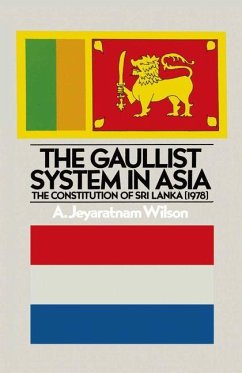
Politics in Gaullist France
Coping with Chaos
Versandkostenfrei!
Versandfertig in 1-2 Wochen
87,99 €
inkl. MwSt.

PAYBACK Punkte
44 °P sammeln!
This is the first book-length attempt to provide a political and historical synthesis of the quarter-century (1958-81) the Gaullists were in power in France while putting the Fifth Republic they created into a broader comparative perspective. The author analyzes the reasons for the success of the Gaullists in bringing France its first successful democratic government, showing that Fifth Republic France and similar interventionist states succeeded precisely because the political model on which they based their actions conformed to the needs of the industrialized world from the late 1930s throug...
This is the first book-length attempt to provide a political and historical synthesis of the quarter-century (1958-81) the Gaullists were in power in France while putting the Fifth Republic they created into a broader comparative perspective. The author analyzes the reasons for the success of the Gaullists in bringing France its first successful democratic government, showing that Fifth Republic France and similar interventionist states succeeded precisely because the political model on which they based their actions conformed to the needs of the industrialized world from the late 1930s through the early 1970s. He then demonstrates that the difficulties the Gaullists and their Socialist successors have faced may be symptomatic of the kinds of problems the entire advanced industrialized world will encounter as we move into the next century. Divided into five parts, the book begins by examining the enduring problems faced by the Third and Fourth Republics in France. The second section covers the new constitution, de Gaulle's behavior as president, and the rationalization of the party system. In Part Three, the author explores how the Gaullists and their allies used the levers provided them by the constitution and by political reforms to take consistent, systematic, and long-term steps to deal with problems that had confounded their predecessors for generations. Turning to the regime's failures, the author analyzes the persistent problems of centralization and alienation that continued to plague France despite the successes of the Fifth Republic. The final section addresses the broader implications of the Gaullist experience for industrialized states in general. An ideal supplemental text for courses in French politics and history, this book offers important new insights into a critical period in that country's modern political development.














